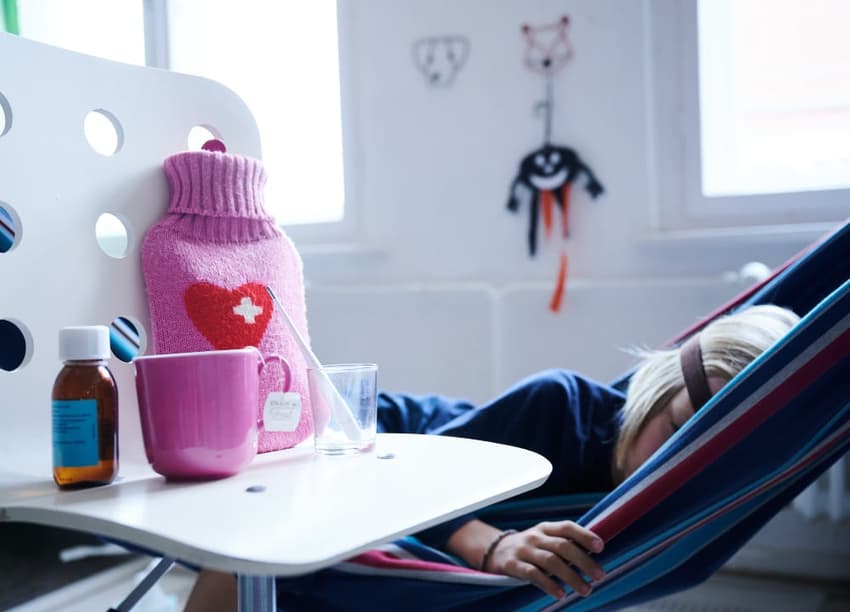How parents in Germany can get paid time off to care for their sick child

It's the midst of flu season, both for employees and their kids. If your child falls ill, here's what you need to know about receiving paid time off in Germany.
Especially during the time of year when it seems like everyone is sniffling and sneezing, it's a scenario that working parents in Germany know too well: their child is too sick to go to Kita or school, and needs to be taken care of at home.
Luckily they have a few options that don't involve dipping into vacation days or having a stressful day in 'home office' juggling meetings and thermometer readings.
How can parents get paid time off to care of their sick child?
When their child falls ill, the most straightforward option for parents is to simply alert their job to get paid time off. But this is limited to just a short period per year: usually five days, unless their contract states otherwise.
The other option they have is to take unpaid days off (Kinderkrankentage, or child sick days) and receive Kinderkrankengeld (child sick pay) through their statutory health insurance.
How much Kinderkrankengeld are parents entitled to?
As of 2024, parents can receive 90 percent of their net salary for 15 working days per child and parent, according to Germany’s Ministry of Health. For multiple kids, a maximum of 35 working days per parent is allotted.
Single parents are entitled to 30 Kinderkrankentage per child, with a maximum of 70 for multiple kids.
READ ALSO: Everything that changes for families in Germany in 2024
How do I apply for Kinderkrankengeld?
To receive child sickness benefit, parents must apply to their health insurance fund and submit a medical certificate confirming their child's illness. Employees should report to their employer immediately if they need time off work due to their child being sick.
Since December 18th 2023, parents have been able to obtain a sick note needed to receive Kinderkrankengeld by telephone without having to go to the doctor's surgery.
As of this year, parents will only need a doctor's certificate for child sickness benefit from the fourth day of sick leave, exactly as in the case of employees who fall all, rather than on the very first day as was previously the case.
READ ALSO: Working in Germany: The rules you need to know if you fall ill
Do parents with private insurance qualify?
Unfortunately parents with private insurance are not legally entitled to Kinderkrankengeld, although every individual insurance company may offer its own alternatives. They are allowed to take paid time off. If only one parent and the child have statutory insurance, only that parent can apply to receive the benefit, maxed at 15 days per child.

Working parents in Germany will no longer be required to get a sick note on the first day of their child's illness. Photo by MART PRODUCTION.
How flexibly can children's sick days be taken?
Parents can also use their leave for individual days. If, for example, they alternate childcare or have other care arrangements for their sick child. However, there is no entitlement to be paid for individual working hours or half days, according to Germany's Health Ministry.
Can the other parent transfer their child sick days to me?
There is no legal entitlement for the other parent to transfer their Kinderkrankentage. However, if the employer of the parent who has already used all the children's sick days agrees, a transfer is possible.
READ ALSO: What benefits are you entitled to if you have children in Germany?
Comments
See Also
Especially during the time of year when it seems like everyone is sniffling and sneezing, it's a scenario that working parents in Germany know too well: their child is too sick to go to Kita or school, and needs to be taken care of at home.
Luckily they have a few options that don't involve dipping into vacation days or having a stressful day in 'home office' juggling meetings and thermometer readings.
How can parents get paid time off to care of their sick child?
When their child falls ill, the most straightforward option for parents is to simply alert their job to get paid time off. But this is limited to just a short period per year: usually five days, unless their contract states otherwise.
The other option they have is to take unpaid days off (Kinderkrankentage, or child sick days) and receive Kinderkrankengeld (child sick pay) through their statutory health insurance.
How much Kinderkrankengeld are parents entitled to?
As of 2024, parents can receive 90 percent of their net salary for 15 working days per child and parent, according to Germany’s Ministry of Health. For multiple kids, a maximum of 35 working days per parent is allotted.
Single parents are entitled to 30 Kinderkrankentage per child, with a maximum of 70 for multiple kids.
READ ALSO: Everything that changes for families in Germany in 2024
How do I apply for Kinderkrankengeld?
To receive child sickness benefit, parents must apply to their health insurance fund and submit a medical certificate confirming their child's illness. Employees should report to their employer immediately if they need time off work due to their child being sick.
Since December 18th 2023, parents have been able to obtain a sick note needed to receive Kinderkrankengeld by telephone without having to go to the doctor's surgery.
As of this year, parents will only need a doctor's certificate for child sickness benefit from the fourth day of sick leave, exactly as in the case of employees who fall all, rather than on the very first day as was previously the case.
READ ALSO: Working in Germany: The rules you need to know if you fall ill
Do parents with private insurance qualify?
Unfortunately parents with private insurance are not legally entitled to Kinderkrankengeld, although every individual insurance company may offer its own alternatives. They are allowed to take paid time off. If only one parent and the child have statutory insurance, only that parent can apply to receive the benefit, maxed at 15 days per child.

How flexibly can children's sick days be taken?
Parents can also use their leave for individual days. If, for example, they alternate childcare or have other care arrangements for their sick child. However, there is no entitlement to be paid for individual working hours or half days, according to Germany's Health Ministry.
Can the other parent transfer their child sick days to me?
There is no legal entitlement for the other parent to transfer their Kinderkrankentage. However, if the employer of the parent who has already used all the children's sick days agrees, a transfer is possible.
READ ALSO: What benefits are you entitled to if you have children in Germany?
Join the conversation in our comments section below. Share your own views and experience and if you have a question or suggestion for our journalists then email us at [email protected].
Please keep comments civil, constructive and on topic – and make sure to read our terms of use before getting involved.
Please log in here to leave a comment.